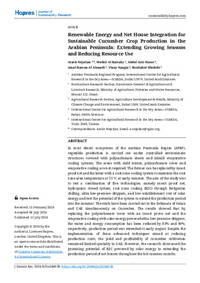Renewable Energy and Net House Integration for Sustainable Cucumber Crop Production in the Arabian Peninsula: Extending Growing Seasons and Reducing Resource Use

Authors:
In most desert ecosystems of the Arabian Peninsula Region (APRP), vegetable production is carried out under controlled environment structures covered with polycarbonate sheets and inbuilt evaporative cooling systems. The areas with mild winter, polycarbonate cover and evaporative cooling are not required. The former can be replaced by insect proof net and the latter with a root zone cooling system to maintain the root zone area temperature at 25 ℃ at early summer. The aim of the study was to test a combination of five technologies, namely insect proof net, hydroponic closed system, root zone cooling (RZC) through fertigation chilling, ultra-low-pressure drippers, and low establishment cost of solar energy and test the potential of the system to extend the production period into the summer. The trials have been carried out in the Sultanate of Oman and UAE simultaneously on Cucumber. The results showed that by replacing the polycarbonate cover with an insect prove net and the evaporative cooling with solar energy powered ultra-low-pressure drippers, the water and energy consumption has been reduced by 85% and 90%, respectively, production period was extended to early August. Despite the implementation of these advanced techniques aimed at reducing production costs, the yield and profitability of cucumber cultivation remained limited specialty in UAE. However, the research showcased the promising potential of RZC powered by solar energy in extending the production period of net houses throughout the hot summer months.
